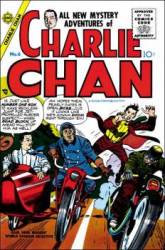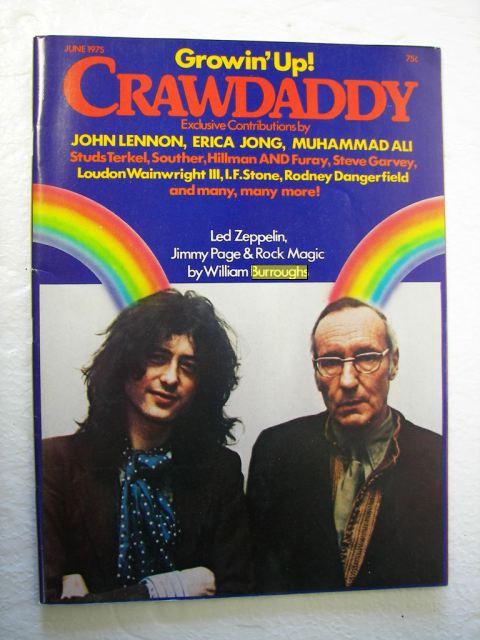It’s one part Bambi, nine parts Looney Tunes, and runs just under three minutes. Dilla, as the film is called, was created by four students at the Ringling College of Art and Design in Sarasota, Florida. It was apparently their senior project completed earlier this year. Nice work Mike, Stanley, Dominic and Mikey …
Everything is a Remix
“Remixing” has figured centrally in the Web 2.0 vocabulary. But, remixing isn’t new. It has a long history, going back as long as we’ve been making art. Artists have always been collecting material, combining it, and transforming it into something new. Kirby Ferguson’s new video, Everything is a Remix, teases this apart as he brings you back to 1960s Paris and London – to the cut-up literature of William S. Burroughs and the songs written by Led Zeppelin with a liberal amount of borrowing. This video, the first in a series of four, appears on Ferguson’s web site in a nice large format. Have a look and consider donating to his Everything is a Remix project.
How To Photograph an Atomic Bomb
Now showing on the New York Times web site, a haunting video slideshow called “Capturing the Atom Bomb on Film.” It features 23 arresting images of atomic bomb tests conducted by the US military between 1945 and 1962. The images (all originally published in the 2007 book How to Photograph an Atomic Bomb) are accompanied by an audio recording of George Yoshitake. Now 82, he’s one of the few surviving cameramen to capture these destructive weapons in action.
via @palafo
China’s Open Courses & Other Tech Dispatches from Asia
Back in 2003, the Chinese government launched its answer to MIT’s OpenCourseWare project. The “National Quality Course Plan” scoured China’s vast university system and selected 3,000 best-of-breed courses in various subject areas. Then, millions of dollars were earmarked to put lectures and related course materials online, with the hope that other professors could draw inspiration from these resources. But, things didn’t go so well. Apparently roughly 50% of these materials never made their way online. And the materials that did were rarely updated. (More on that here.) Will the project get renewed? Jeff Young, a reporter for The Chronicle of Higher Education, went to China to find out. His report (read it here) is part of a month long series of dispatches that takes you inside Asia’s wired classrooms and high-tech research labs. You can read Jeff’s daily posts from Singapore, China, South Korea, and India throughout this entire month.
Update: One of our readers wrote a thesis on China’s opencourseware initiative and offers much more detail on what went right, and what went wrong. You can download Stian Håklev’s thesis (for free) here, and be sure to check out Stian’s other brainchild, Peer2Peer University, otherwise known more simply as P2PU.
Free Golden Age Comics
 A quick fyi for the comic fan: A newish website, The Digital Comic Archive, opens up free access to public domain Golden Age Comics, which fell into kids’ hands from the late 1930s until the early 1950s. You won’t find here the big name comics from the period (Superman, Batman, Captain America, Wonder Woman, Captain Marvel, etc). But that shouldn’t stop you from giving the archive a good look. There are still a lot of golden comics to rummage through.
A quick fyi for the comic fan: A newish website, The Digital Comic Archive, opens up free access to public domain Golden Age Comics, which fell into kids’ hands from the late 1930s until the early 1950s. You won’t find here the big name comics from the period (Superman, Batman, Captain America, Wonder Woman, Captain Marvel, etc). But that shouldn’t stop you from giving the archive a good look. There are still a lot of golden comics to rummage through.
To get started, simply register for an account and then start sifting and downloading the texts. The downloading part can be a little tricky in some cases. So please visit their FAQs if you run into any problems. Happy reading…
Gustavo Dudamel with the Vienna Philharmonic: A Free Live Webcast
Mark this on your calendar. This coming Saturday, at 7:30 a.m. California time, Gustavo Dudamel (soon to open the 2010-11 season of the Los Angeles Philharmonic) will conduct a concert with the Vienna Philharmonic at the Lucerne Festival in Switzerland. As the LA Times reports, the concert will be webcast live for free at www.medici.tv. It will also be available for 90 days on demand. Pieces will include Rossini’s overture to “La gazza ladra,” Orbón’s “Tres versiones sinfónicas,” Bernstein’s “Divertimento for Orchestra” and Ravel’s “Pavane pour une infante défunte” and “Boléro.”
William S. Burroughs Reviews a Led Zeppelin Concert for Crawdaddy! Magazine (1975)
Crawdaddy! It was the first US magazine of rock music criticism, preceding both Rolling Stone and Creem. Paul Williams, then a student at Swarthmore College, first launched the magazine in 1966. And by the 1970s, Crawdaddy! hit its stride, publishing exclusive contributions by John Lennon, Joseph Heller, and Studs Terkel, to name a few. On one occasion, the self-described “first magazine to take rock and roll seriously” sent William S. Burroughs, the great beat writer, to a Led Zeppelin concert. He came back in June 1975 with a rather offbeat concert review. There’s a strange innocence, even naivete, to the whole piece (though we know better than to confuse Burroughs himself with innocence). We give you an excerpt right below, and the rest here.
So there we sat, I decline earplugs; I am used to loud drum and horn music from Morocco, and it always has, if skillfully performed, an exhilarating and energizing effect on me. As the performance got underway I experienced this musical exhilaration, which was all the more pleasant for being easily controlled, and I knew then that nothing bad was going to happen. This was a safe and friendly area–but at the same time highly charged. There was a palpable interchange of energy between the performers and the audience which was never frantic or jagged. The special effects were handled well and not overdone.
A few special effects are much better than too many. I can see the laser beams cutting dry ice smoke, which drew an appreciative cheer from the audience. Jimmy Page’s number with the broken guitar strings came across with a real impact, as did John Bonham’s drum solo and the lyrics delivered with unfailing vitality by Robert Plant. The performers were doing their best, and it was very good. The last number, “Stairway to Heaven”, where the audience lit matches and there was a scattering of sparklers here and there, found the audience well-behaved and joyous, creating the atmosphere of a high school Christmas play. All in all a good show; neither low nor insipid. Leaving the concert hall was like getting off a jet plane.
The Burroughs piece continues here.
Related Content:
‘Stairway to Heaven’: Watch a Moving Tribute to Led Zeppelin at The Kennedy Center
Led Zeppelin Plays One of Its Earliest Concerts (Danish TV, 1969)
Hear Led Zeppelin’s Mind-Blowing First Recorded Concert Ever (1968)
The Illustrated Guide to a Ph.D.
Matthew Might, a computer science professor at the University of Utah, writes: “Every fall, I explain to a fresh batch of Ph.D. students what a Ph.D. is. It’s hard to describe it in words. So, I use pictures.” Here it goes. Matt’s Illustrated Guide:
Imagine a circle that contains all of human knowledge:

By the time you finish elementary school, you know a little:

By the time you finish high school, you know a bit more:

With a bachelor’s degree, you gain a specialty:

A master’s degree deepens that specialty:

Reading research papers takes you to the edge of human knowledge:

Once you’re at the boundary, you focus:

You push at the boundary for a few years:

Until one day, the boundary gives way:

And, that dent you’ve made is called a Ph.D.:

Of course, the world looks different to you now:

So, don’t forget the bigger picture:

Keep pushing.
You can find Matt’s Illustrated Guide hosted on his web site. This guide/reality check is published under a Creative Commons License. You can also buy a print version for $6.50. (The money goes to charity.) Matt offers more insights for Ph.D. students here.



